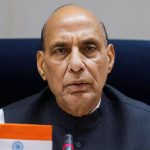October 16 every year celebrated all across the globe as World Food Day this year aims to highlight the critical role of water for life and for our food systems. This year the theme ‘Water is Life, Water is Food’ speaks in volumes that life and livelihoods depend upon water. Water is a ‘sine qua non’ for human existence ad its sustained availability is of prime importance.
Before moving ahead on importance of water, let me focus on World Food Day in few lines. Long time back, an idea of a global organization to work for and to ensure food security for all was floated. However, this idea wasn’t put into practice until 1905. That is when an international conference was first held in Rome, due to the efforts of US agriculturalist David Lubin. This conference resulted in the creation of an agency known as the International Institute of Agriculture which can be called as a precursor of the present Food and Agriculture Organization. After World War II the then United States President Franklin D. Roosevelt decided that an agency needed to be formed to replace the International Institute of Agriculture. He called a meeting which was held at Qubec, Canada in 1945 to discuss and advance that idea.
On October 16th, 1945, the Constitution of the Food and Agriculture Organization was drafted. When the United Nations was created to replace the ineffective League of Nations on October 24th, 1945, then the Food and Agriculture Organization was placed under its powers. Since its formation, the Food and Agricultural Organization of the United Nations has been working to raise levels of nutrition, improve agricultural productivity at all levels, enhance the lives of rural populations and contribute to the growth of the world economy. It also provides assistance to countries changing their agricultural policy, to aid regions out of famine situations, to help implement appropriate technology and facilitate a neutral environment to discuss issues around food production.
At the FAO’s 20th session in Rome, Italy, in November 1979 the conference called for the observance of World Food Day on October 16, 1981, and on the same date each year. The Hungarian Delegation, led by the former Hungarian Minister of Agriculture and Food Dr. Pál Romány, played an active role at the 20th Session of the FAO Conference and suggested the idea of celebrating the World Food Day worldwide. The UN General Assembly ratified this decision on December 5, 1980, and urged governments and international, national and local organizations to contribute to observing World Food Day. It has since been observed every year in more than 150 countries, raising awareness of the issues behind poverty and hunger. World Food Day has been held each year since 1981. Each year has a different theme. Every year since 1981, World Food Day has had a theme to help people focus their attention on a particular aspect of global hunger. For instance, in 1981, the theme was ‘Food Comes First.’ In 2023 the theme is Water is Life, Water is Food’. The theme stresses on the importance of water for food and life. Water is an essential requirement for all the food systems. We cannot imagine agriculture without adequate water.
A 2020 report of Food and Agriculture Organization (FAO) ‘State of Food and Agriculture’ came out with some serious concerns regarding water. It stressed on overcoming water challenges in agriculture. The report reveals that at present 3.2 billion people live in agricultural areas with high or very high water shortages or scarcity, of which 1.2 billion people live in areas with very high water constraints. From the 1.2 billion people, nearly half live in Southern Asia, and about 460 million live in Eastern and South-eastern Asia. Without immediate action, many more will be affected.
In India, as per the Central Water Commission, 85.3% of the total water consumed was for agriculture in the year 2000. This is likely to decrease to 83.3% by 2025. India does not spend any money in conserving water consumed in agriculture. Surprisingly, water conservation takes place in the industry and utility sectors, both of which consume less than 5% of the nation’s water. the population increase and changing lifestyles has increased demand for water (largely for irrigation) in both urban and rural areas. India has 18% of world population, having 4% of world’s fresh water, out of which 80% is used in agriculture.
During the 2011 census, India entered the league of water deficient nations. A nation is considered water deficient if the per capita availability falls below 1700 cubic meters per person. The per capita water availability that fell by 15% during the first decade of this century to 1545 cubic meters per person and was expected to be below 1400 cubic meters per person the following summer. Though the rate of depletion has reduced in the last few years, we are still consuming much more than is being replenished by nature. Here lies the danger. We will be leaving a troubled legacy for the next generation unless we take quick remedial actions to reverse the trend.
Faulty agricultural practices are also responsible for the sorry state of affairs. Many other factors are also contributing for this water scarcity which includes the climate change, rising population, the water wastage, its non judicious use, socio-economic development and many others. There has been a rising demand for this precious natural resource. The anticipated impacts of climate change, such as uncertain rainfall and water availability, further exacerbate these factors. Rising incomes and urbanization are leading to increased water demand from industry, energy and services and the dietary changes also imply more demand for water-intensive foods (e.g. meat and dairy products).
Conserving Water
Water is a precious resource and needs to be conserved. Ultimately the solution for overcoming the water scarcity has to come from each of us. As agriculture is the largest withdrawal of water, water use in agriculture has to be made more efficient and sustainable. The basic principle should be ‘more crop, per drop’. Many water conservation practices like drip, sprinkler can be adopted more so in rainfed regions of the country where water availability is an issue. Rainwater can be harvested in farm ponds and roof tops for further use in times when water scarcity occurs. The drip and sprinkler system of irrigation avoid the conveyance losses and make the water available directly in the root zone of the plants. Flooding of fields should be avoided. Paddy requirements for water according to FAO estimates make it as one of the most water intensive crops. Techniques like System of Rice Intensification that avoid flooding rice fields should be promoted for cultivation of rice.
In our own houses, micro level efforts like plugging the leekages of taps, avoiding waste of water while bathing, washing clothes and brushing the teeth; using water from kitchen to irrigate kitchen gardens, avoiding pollution of water can go a long way in ensuring that water is available to those who could not get this precious resource due to our mistakes.
(The author is scientist, SKUAST-K and can be reached at: [email protected])





